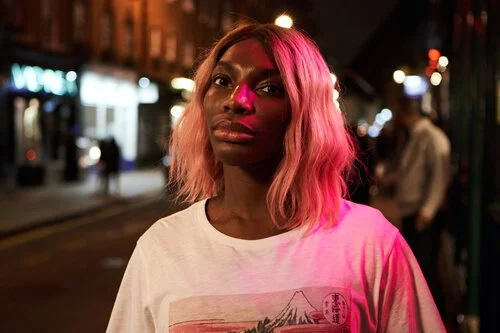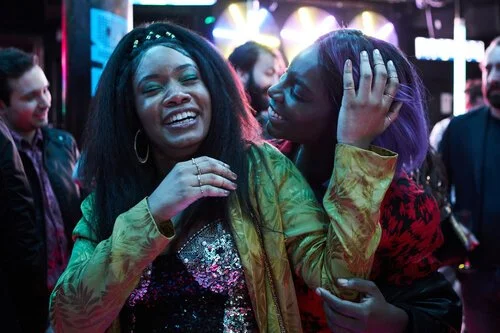Michaela Coel's I MAY DESTROY YOU is an Unexpected Comfort Blanket for Assault Survivors
Photograph by Natalie Seery/HBO
This article was originally written for Sainte Magazine.
CW/TW: THIS ARTICLE CONTAINS DISCUSSION OF RAPE, SEXUAL ASSAULT, AND TRAUMA.
[the following contains spoilers]
Michaela Coel’s incredible, dynamic new show is the talk of the summer. As it should be. In a June 30th interview with Olive Pometsey at British GQ, Coel states, “I don’t think I have a version of writing that’s not meant to be shared.” I breathed a sigh of relief, because what a fucking gift that is.
If you’ve not yet seen I MAY DESTROY YOU, the based-on-real-events story follows Arabella (who also goes by Bella, played to perfection by Coel), a funny, chaotic, somewhat selfish writer living in London and working on her second book after a hugely successful debut. In the first episode, she is raped after someone drugs her drink at a bar. The viewers see who it is, but Bella, either through blurriness from being drugged or the post-traumatic inability to see and accept the full truth of the situation, does not. Every episode following (six of twelve have premiered at the time of publication) deals with trauma in some way. As a rape survivor (one who has so far watched every episode at night, alone in the dark), I immediately felt the heaviness. I cried as soon as I saw Bella stumbling through the bar, my stomach twisting with fear, and continued to watch teary-eyed as it dawned on her what had happened. But then I started recognizing reactions and patterns of behavior, and soon it wasn’t just the situation that I related to. It was Bella herself, and by extension Michaela Coel. I felt witnessed.
What I MAY DESTROY YOU does more accurately than anything else I’ve seen is the portrayal of the aftermath. Trauma manifests in so many different ways, so many different emotions, the least of which is the neverending balancing act of extreme highs and extreme lows. Bella’s life is pretty wild to begin with, but the way the show honors these, sometimes small, moments makes it abundantly clear the effect that this event has had on her brain. Bella is always one to go after fun, can make a joke out of anything, and surrounds herself with friends to the point of distraction. Whenever she finds herself alone, panic sets in. She breaks down; she sobs in a way that survivors are all too familiar with. But we also see these moments buoyed by an inflated self-confidence, determination, and resolve, drying her tears and basking in the love and support of strangers on social media.
In another ode to trauma, Bella sometimes talks about her rape bluntly, veiled in humor. Although it usually results in making whoever she’s talking to uncomfortable, viewers can see that it comforts her. I’ve done this, too. It does, for sometimes the briefest moment, give power to the survivor -- a way of saying, “Yes, this happened to me, but it is not all that I am.” The aftermath is handled with such detail and such extreme care, it almost feels like Michaela Coel has taken pages of my own journal, or notes from my therapist, and used them in her scripts.
I MAY DESTROY YOU also generously shares the stories of the people in Bella’s life, revealing that she is not the only one who’s been assaulted. In fact, an assault happens to someone else while Bella is actively dealing with the aftermath of her rape. It shows how truly common assault is and how easy it is to be misinformed about its definitions. Many people believe rape is an active assault on a person, but this show portrays many instances that are still considered assault, even if it may be a gray area for the viewer. One episode confronts the act of men removing condoms mid-sex without the approval or knowledge of their partner. Another deals with the manipulation of a teenager. Another involves a rape, which I’m not 100% sure the character it happens to is fully aware of, when two men pretend to not know each other and seduce her into having a threesome.
As a rape survivor, viewing this subject is often complicated. Rape, assault, trauma, and aftermath are not talked about like this in media, so in addition to shows or movies with rape scenes being extremely triggering for me, the way these things are portrayed tends to make me feel even worse. More often than not, rape and assault are used as plot points, usually happening to female characters to give male heroes something to brood over - a cause for vengeance, a reason to live, etc. Sometimes, as seen in another beloved HBO show, rape is a device to really drive home how terrible a character is (like we didn’t already know from all the murder and the torture). If it is treated seriously, it’s usually weirdly placed in a one-off episode of a teen drama, handled like a PSA, and then never really spoken of again. As if trauma can be hung up after the credits roll.
Admittedly, it’s a little jarring to watch this show and make a list of all the non-consensual sexual situations that have happened just within the first half of the first season, while thinking to myself I’m excited to see where this show goes rather than I never want to watch this again. Despite it all -- despite the subject matter and my very heavy feelings about it -- I MAY DESTROY YOU remains hilarious, charming, almost bittersweet. Probably because Coel is drawing from her very own experiences, the show allows you to laugh with Arabella. At her, even.
Michaela Coel’s genuine and ruthless power as a storyteller is on full display here. And it is necessary.
I MAY DESTROY YOU is destroying me. But it’s healing me, too.
Photograph by Natalie Seery/HBO

